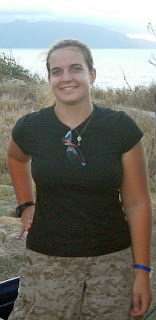"I spent a week on that island," she said, recalling with delight the variety of ocean life she saw up close and even held. "Coming from a landlocked state, you don't realize everything that happens."
"It was the first time I saw a leopard shark," she said. "I was excited and curious to see and experience what else was out there."
When it was time for college, she applied to a few mainland schools. One in-state school had "more of an aquatics program" that dealt with lakes. "That's not really any form of marine science," she said.
Fortunately, a friend who was accepted at HPU encouraged her to apply. Even better, Donahue qualified for a scholarship. She started at HPU, in fall 2012.
As a student in the Concurrent Program in Marine Science, she can take a certain number of classes that count toward undergraduate and graduate degree requirements. She graduates with a B.S. in Marine Biology in May 2016 and anticipates to defend her M.S. in Marine Science thesis in December 2017.
Donahue also studied abroad, while at HPU. In fall 2013, she travelled to Panama. "It was awesome. You've got every tropical ecosystem in Panama. We got to study tropical forests, the Atlantic Ocean."
Her work was related to protected areas to help shark populations recover. "I went to interview local fishermen to ask them about supporting limits of shark fishing."
She found the working professionals were open to talking about issues related to their livelihood. Officials and representatives were not as forthcoming. "They weren't interested in slowing it down. It was very frustrating. At the rate that it was going, the shark was going to be depleted."
The following semester in Tanzania, she studied crab and mangrove species diversity. As she explored the area, she could see the benefits of establishing protected areas. Some places were better off than others. She saw dead coral, which affected other life. In other areas, water was contaminated. "They told me not to swim."
"Why isn't this fixed? Everyone knew about the pollution but shrugged it off."
It helped her realize that scientists can call attention to important issues by "finding ways to get the local community involved to protect these beautiful ecosystems."
Back at HPU, she began working at the Pelagicos Lab, with Associate Professor of Oceanography David Hyrenbach, Ph.D. The work was in line with her new appreciation of the relationships between local communities and their ecosystems. She's researching Red Footed Boobies by examining their diet and linking it to their movements. This work can be useful in learning what is happening to an environment over time, by studying what affects the food chain.
Recently, she was recognized at the Pacific Seabird Group meeting, held on Oahu, in February 2016. Donahue received the runner up student presentation award for her poster "Diet of Red-footed Boobies Provisioning Chicks on O‘ahu."
"That was my first conference and public presentation," she said.
She also met people who were cited in her work. "You never think about meeting the researchers you study."
Meeting other scientists, researchers and students gave her perspective about her chosen career and her dedication to protect the environment.
"They honestly care about what they do. It's not a lab job," she said, with a smile.
Visit the Pelagicos Lab at www.pelagicos.net.
 |
| Donahue is often in the field, conducting research. |

No comments:
Post a Comment